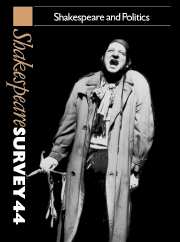Book contents
- Frontmatter
- Shakespeare and Politics
- Language, Politics, and Poverty in Shakespearian Drama
- Some Versions of Coup d’état, Rebellion and Revolution
- Woman, Language, and History in The Rape of Lucrece
- Love in Venice
- Two Kingdoms for Half-a-Crown
- ‘Fashion it thus’: Julius Caesar and the Politics of Theatrical Representation
- ’Demystifying the Mystery of State’: King Lear and the World Upside Down
- Tragedy, King Lear, and the Politics of the Heart
- The Politics of Shakespeare Production
- Shakespeare in the Trenches
- Shakespeare’s Earliest Editor, Ralph Crane
- Shakespeare’s Falconry
- Telling the Story of Shakespeare’s Playhouse World
- Shakespeare Performances in England, 1989–90
- Professional Shakespeare Productions in the British Isles January-December 1989
- Critical Studies
- Shakespeare’s Life, Times, and Stage
- Editions and Textual Studies
- Books Received
- Index
Tragedy, King Lear, and the Politics of the Heart
Published online by Cambridge University Press: 28 March 2007
- Frontmatter
- Shakespeare and Politics
- Language, Politics, and Poverty in Shakespearian Drama
- Some Versions of Coup d’état, Rebellion and Revolution
- Woman, Language, and History in The Rape of Lucrece
- Love in Venice
- Two Kingdoms for Half-a-Crown
- ‘Fashion it thus’: Julius Caesar and the Politics of Theatrical Representation
- ’Demystifying the Mystery of State’: King Lear and the World Upside Down
- Tragedy, King Lear, and the Politics of the Heart
- The Politics of Shakespeare Production
- Shakespeare in the Trenches
- Shakespeare’s Earliest Editor, Ralph Crane
- Shakespeare’s Falconry
- Telling the Story of Shakespeare’s Playhouse World
- Shakespeare Performances in England, 1989–90
- Professional Shakespeare Productions in the British Isles January-December 1989
- Critical Studies
- Shakespeare’s Life, Times, and Stage
- Editions and Textual Studies
- Books Received
- Index
Summary
I should like to begin by expressing two reservations about political criticism of Shakespeare as it is practised today. First, it seems at times to participate in the prevalent blurring of all generic distinctions to the extent of dissolving immensely complex artistic structures and consigning them to an amorphous continuum of ideology and discourse. Thus it is apt to evade a question of perennially absorbing interest: what constitutes the unique quality or singular greatness of this particular play? Why is it that four hundred years of cultural change, have not diminished its appeal to audiences and readers alike? Second (and this point is connected with the first), political criticism is largely if not wholly indifferent to the affective dimension of the plays, an indifference which seems least defensible in relation to the tragedies.
In seeking to counteract these tendencies without relapsing into mere formalism, one might mark out an appropriate theoretical position with the combined assistance of Philip Sidney and Mikhail Bakhtin. Bakhtinian poetics postulate that every literary genre is embedded in contemporary history and subject to extra-literary institutions. At the same time each genre has its own past, its own dynamic development, and a set of norms and conventions which help to shape and control the author's representation of reality. The Bakhtinian concept of genre is central to a poetics which fully acknowledges the intrinsic properties as well as the socio-historical determinations of literature. Sidney's relevance to the question lies in his claim that tragedy serves a political function, that is, works against tyranny, by virtue of its capacity to excite 'admiration and commiseration', to 'draw . . . an abundance of tears', and to 'move' and 'mollify' the 'hardened heart'. This perspective on tragedy was widespread in the Renaissance and ultimately goes back to the Greeks, for whom emotional intensity was the form's chief characteristic. It is wholly bound up, moreover, with classical and Renaissance rhetorical tradition, which taught that cognitive and behavioural change should be brought about through an appeal to the affections.
- Type
- Chapter
- Information
- Shakespeare Survey , pp. 85 - 90Publisher: Cambridge University PressPrint publication year: 1991

